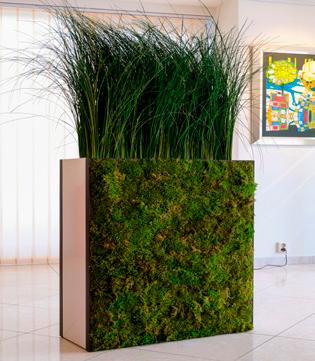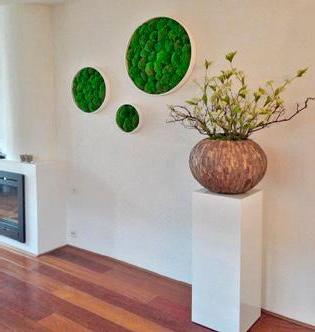
33 minute read
Sustainability Special
Special feature: SUSTAINABILITY
These days, sustainability plays a major part in our everyday lives. We’re all becoming increasingly aware of it and see the urgency to preserve a good balance between people, the environment and the economy. That’s important now and will be even more so for generations to come. Fortunately, more and more companies are making a serious commitment to corporate social responsibility and sustainability. This issue’s special feature on Sustainability spotlights companies that are making a conscious choice to be sustainable and are excited to tell our readers about what they’re doing.
Advertisement
ELINE KIK
We’re kicking off with an interview with Eline Kik, director of Green Business Club Zuidas. GBC Zuidas is a foundation that works to achieve concrete results by spearheading sustainable projects.
What’s the overall aim of Green Business Club Netherlands? ‘’Green Business Clubs (GBC) are local networks made up of industry, government and knowledge sector players in a given geographic area. We work together on concrete projects to make those areas more sustainable. It’s all about taking action. Right now, there are 13 local GBCs nationwide as well as a broad central platform – GBC Netherlands – that supports the local GBCs. The idea was conceived in 2011 by ABN AMRO’s sustainable banking unit in cooperation with the City of Amsterdam and ORAM network. They were quickly joined by founding partners Loyens & Loeff, Vesteda, VU Amsterdam, RAI Amsterdam and Accenture.’’ Your activities at GBC centre around Zuidas. What’s the focus here and what’s your role? ‘’I’m the programme director for GBC Zuidas. We’ve got an enthusiastic team and 55 member organizations with which I work to realize this incredible club’s ambitions. One project we’re working on now is Zero Waste Zuidas. Our goals are 0% residual waste by 2030, eliminating Zuidas’ dependence on natural gas, improving urban logistics by provisioning offices from a hub using electric delivery vehicles, and installing 25,000 m2 of water-retaining green rooftops. We’re already more than halfway to achieving that last goal.’’
Is Zuidas sustainable enough, in your view? ‘’Zuidas is by no means sufficiently sustainable. We’re up against some tremendous challenges. As the country’s premier office location, Zuidas wants to be a frontrunner in sustainability. We’re succeeding more and more when it comes to ultra-innovative and sustainable office and residential building, but there’s still so much to do. Particularly in terms of our use of existing office properties and our behaviours, Zuidas needs to take a more critical look at itself. There are still a lot
of lights on outside working hours, lots of needless business flights and commuting by car, instead of using public transport and bikes. Much remains to be done on waste reduction, reuse and better processing. But, on the plus side, we’re tackling these things together in concrete projects. And, increasingly, we’re seeing people in Zuidas take responsibility for their own role, committing to the cause and taking real steps to make Zuidas sustainable.’’
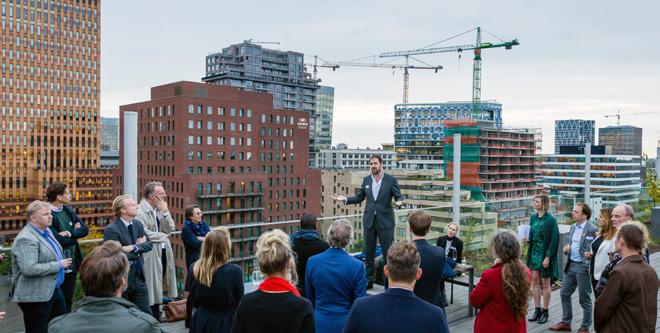
How can companies make a start on greening their operations? ‘’One best practice adopted by GBC member Houthoff and others is to go broad and create a ‘green team’ with representatives from across all of your organization’s various divisions. Then, start with a measurement: What’s your company’s carbon footprint? That brings into focus promising areas where you can have a big impact. Tackle projects where be eco-friendly or circular purchasing, or maybe setting up a more sustainable employee mobility policy – ithat varies with every company. And there’s no need to reinvent the wheel. Find the knowledge that’s out there and join forces with other organizations in platforms like Green Business Club.’’
Could you describe your partnership with Hello Zuidas in relation to the sustainability report and award? ‘’Green Business Club Zuidas works closely with Hello Zuidas. Since 2013, GBC Zuidas, Hello Zuidas and the Zuidas Amsterdam Development Office have issued the annual Zuidas Sustainability Report, containing an overview of sustainable developments in the district. That report is being replaced in 2021 by the Zuidas Sustainability Award, to be presented for the first time ever to the most innovative, impactful or inspiring initiative in Zuidas. An expert panel of judges will assess all submissions, which will be published on www.zuidasduurzaam.nl.’’
you can exert a direct influence. That might
How do you envision the future of Zuidas? ‘’As a flourishing, dynamic district with impressive offices, residential towers where everyone may find a home and a place where knowledge and innovation count as central values. With VU as the country’s most sustainable university right here in Zuidas, that’s something we can achieve. These days, Zuidas is seen not just as the financial heart of the Netherlands, but as a model for how profit can go hand in hand with fostering a better world.’’
Is there anything else you’d like to share? ‘’GBC Zuidas will be celebrating her 10-year anniversary in 2021 and we want to celebrate with our 55 loyal members and all the wonderful organizations we work with. We’re putting together some anniversary festivities, but are also open to more ideas. Got an idea or want to get involved in Green Business Club Zuidas? We’d love to hear from you: zuidas@greenbusinessclub.nl.’’
SUSTAINABILITY: A HOT TOPIC IN FINANCE AND LAW
These days we all know why sustainability is important, but how financial institutions and corporates can best implement it in their operations is a different story. With all the laws and regulations developed in European initiatives to get sectors actively on board with sustainability targets, many companies find themselves in a difficult situation. Companies want to do ‘good’ and want to comply quickly. However, there are simply a lot of rules to deal with and implementation mistakes can have far reaching consequences. That’s exactly where Suzanne Kröner-Rosmalen of Stibbe can help. She specialises in advising financial institutions and corporates about sustainable finance issues. ‘Helping companies making complex laws easy to work with – that’s what drives me.’
SUZANNE KRÖNER-ROSMALEN COMPLEX SET OF RULES Willingness is growing among sectors and organizations to tackle the sustainability challenges and take concrete steps towards a sustainable future. It’s not easy to venture into this unknown territory. Especially not with the European Commission setting out extremely ambitious regulations, Suzanne acknowledges. Increasingly, financial enterprises and shareholders are being required to focus efforts on greening the financial sector. ‘We’ve seen the emergence of complex regulations in a short time span, and with each one we have to wait and see how legal implementation will work in practice. The rules vary from disclosures on how green financial products are, to how sustainability is factored into decision making processes, how sustainability risks are taken into account and how sustainability fits into good corporate governance.

Being involved in this legal transition gives KrönerRosmalen immense satisfaction. ‘These regulations are complicated, but they’ll have a huge effect on

all kinds of enterprises in the financial sector, from pension funds, banks and insurers to corporates and other stakeholders. It is exciting to experience the positive energy within companies that are implementing these rules. However, we do advise to remain critical as well and to push-back when needed, because simply implementing everything as fast as possible can have its downsides and can be risky in view of other legal obligations.’
CLIMATE CHANGE AND RISK MANAGEMENT ‘That climate change would become part of the daily job of a financial regulations specialists was something that I did not expect when I started at Stibbe 13 years ago.’ As she explains that is nowadays the case. Sustainable finance laws are developed as part of a bigger plan of action to limiting the global temperature increase. Also, financial institutions must factor consequences of changing climate and the transition to carbon neutral economy in their risk models. For example, if more floodings occurs, damages can increase which could lead to losses through exposures to the sectors that are impacted.
SUSTAINABLE FUTURE So, what does sustainability mean for Stibbe? ‘First of all, sustainability (and also Environmental Social and Governance, ESG) are part of our services. To be able to assist our clients with the identification, analysis and integration of sustainability and ESG topics in their operations we have a dedicated and multidisciplinary team combining all relevant expertise. ESG challenges are broad and require the attention of all divisions within an organization.’ And how is Stibbe as a company here at the Zuidas contributing to a sustainable future? ‘Also in many different ways and on different levels and we have dedicated colleagues who put effort in meeting sustainability standards. Our building has for example a BREEAM certificate, was built sustainably and meets sustainability standards. Beyond that, we’re constantly looking how to be more sustainable on an everyday level – from postal delivery to catering, you name it.’ STIBBE N.V. Suzanne Kröner -Rosmalen Advocaat +31 (0)6 46 20 44 52 Suzanne.Kroner -Rosmalen@stibbe.com
Integrating sustainability: AN EVOLVING PROCESS
You can’t talk about the future without talking about sustainability. Just ask Bart-Jan Freriks, managing director of ENGIE Services for the West Netherlands region. He and his 5,700 colleagues across the Netherlands are working on questions at the interface of technology, energy and sustainability, such as: How can we engineer buildings like hospitals, offices, schools and universities to be sustainable? ‘There’s far more to it than only supplying renewable energy’, says Freriks. ‘Our specialists supply advice, engineering, project management and the installation, management and maintenance, optimization and operation of our clients’ technical assets.’
IMPARTIAL PARTNER ENGIE Services works closely and impartially with ENGIE Energie, so the sustainable technology they supply is fully supported by a sustainable service. The aim is to remove barriers between technology, knowledge and convenience. ‘Working together without having to factor in all kinds of interests keeps us open to new solutions, like reusing equipment and systems’, Freriks explains. ‘With minor adjustments, it’s possible to make huge strides in sustainability.’
‘Sustainability as a field is continually evolving. From ‘smart buildings’ we’re shifting to ‘smarter buildings’ that enhance users’ wellbeing. That means you have to understand the different groups of users’, Bart-Jan continues. ‘Once you know that, you can do tests and translate the results into a sustainable framework to create a sustainable, pleasant environment for the greatest number of people.’
CHALLENGES Technologically, the sky’s the limit – almost – but first the costs have to come down. Take solar panels, which were still a hefty investment not so long ago. These days, solar power is within reach for many more people. And while the possibilities are growing, that’s also part of the challenge. To supply enough energy to power all these developments, we need more and more energy. Which can lead to ‘grid congestion’ – where the
BART-JAN FRERIKS
power grid gets clogged up. Solutions include flexible systems to switch supplies on and off and storing power locally.
It’s precisely on solutions like these that Freriks is working with his team, piecing together new challenges and technologies to come up with innovative ideas. Even in these times, when we’re all in the grip of the pandemic, it’s important that sustainable energy continues to develop. To do something about empty office buildings, for instance. At the same time, it’s raising new questions: Do we really need and want so many people driving to and from offices every day? And: How might we make more efficient use of office buildings?
SUSTAINABILITY AND THE CORONAVIRUS The kind of working from home we’re doing these days has caused a lot to change. Office buildings are deserted and now we’re reconsidering the comfort and wellbeing of working at home. It has also triggered some economic uncertainty. Result? Investments in sustainability are being put off. ‘A shame’, Freriks observes. ‘It’s precisely now that we can made big strides here. With fewer cars on the roads, the air is getting cleaner, and that’s a great nudge to get us moving.’ Vacant buildings are forcing us to think about solutions and alternatives. The space-to-staff ration is shifting. If working from home sticks, desks could make way for meeting places. Workspaces could be used more efficiently. And that would free up room for things like more housing. All of these transformations demand modifications in technology, energy and services – think improved ventilation systems, sensors, light and climate control – to name a few.
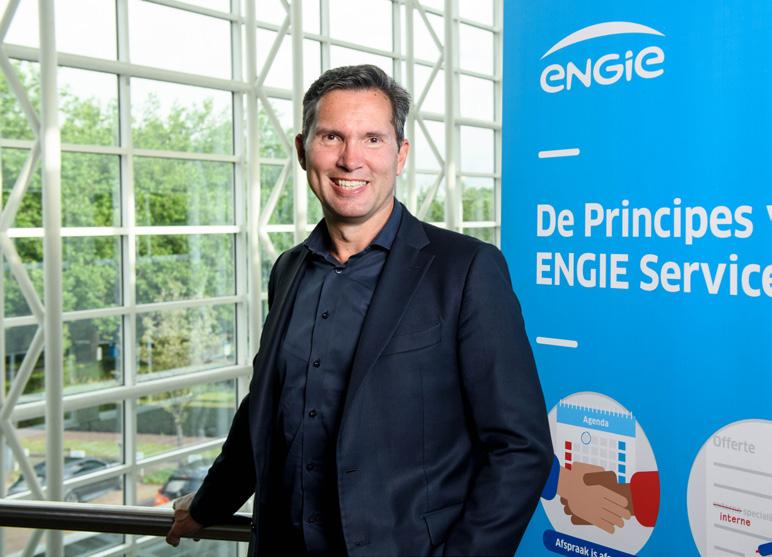
PROUD TO BE DUTCH Bart-Jan says he’s proud of the Netherlands ‘That we’ve come up with new, innovative ideas in times like these is marvellous to see and be a part of. If we can all consciously put our minds to this, we can keep making strides. Towards a bright, healthy and sustainable future.’ ENGIE Services West Albert Heijnweg 1 1507EH Zaandam +31 (0)75 653 70 00 www.engie-services.nl
GOING GREEN, TOP-DOWN ‘There’s so much unused potential in Zuidas for green roofs’
Sustainability is a topic that’s gaining increasing traction. For real estate adviser Savills, it’s particularly relevant. Savills’ Property Management Team works for various property owners who have committed to the goals of the Paris Climate Agreement. Savills is working with its clients to examine what changes they can make to get their buildings up to the highest sustainability standards and at least comply with current laws and regulations. Associate facility manager Femke Boon and associate Irene van Esseveld talk about what sustainability means for Savills.
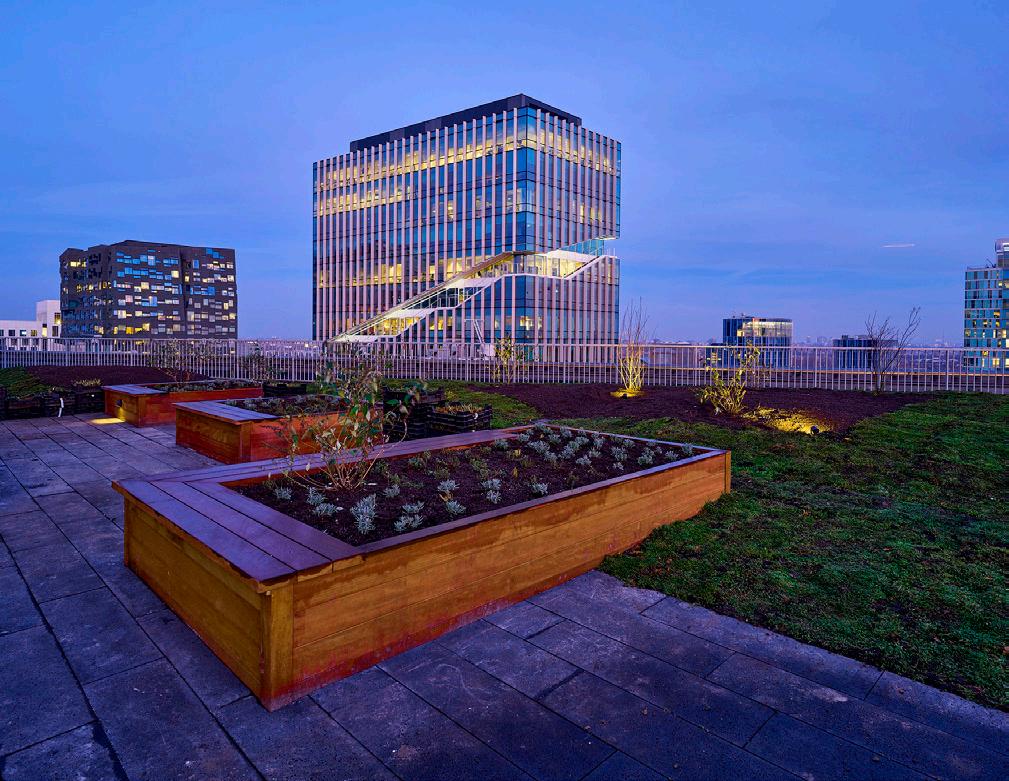
IRENE VAN ESSEVELD FEMKE BOON
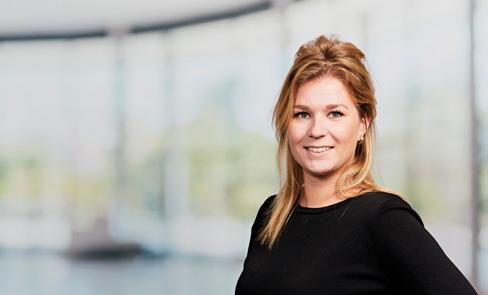
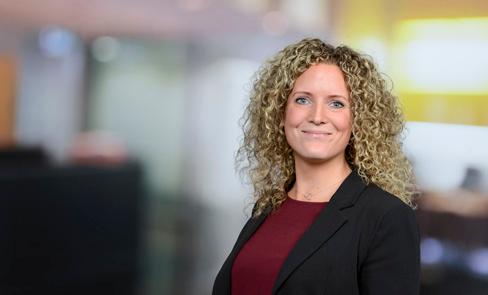
What steps are you taking to maximize compliance with climate legislation and regulations? Femke: ‘Our Sustainability Team is made up of various specialists who are able to address specific questions relating to sustainability. The custom service we provide centres on reducing energy consumption and the technical measures needed to do that. Working on behalf of a building owner, we analyse their building’s current performance and then implement the investments the owner needs to make. And of course aside from that, we have an additional focus on contracting green, renewable energy for all the buildings under our management.’ Irene: ‘Another thing we’re working on is the development of Savills RISE. Savills RISE centres on building users, and specifically on building comfort. That covers everything from friendly service to local business initiatives and the well-being of tenants. When we start to apply Savills RISE in future, these kinds of almost unquantifiable but very appreciable services will actually be measurable. Using audits, we’ll be able to enhance the experience of hospitality and comfort in the buildings.’
You manage several properties in Zuidas that have rooftop gardens. What do those gardens look like, and why are they important?
Femke: ‘Before looking at what’s on the roof, we need to consider the street level. Zuidas is concrete in every direction, with few green spaces. Those paved surfaces make it hard for water to be absorbed into the ground, and the municipal sewers aren’t equipped to handle that much runoff. Also, rainfall has been getting heavier, exacerbating the situation. By modifying the roof cladding and opting for an environmentally-friendly solution like sedum, water can be absorbed by the plants and stored on the roof. The water drains off more slowly and is partly retained by the vegetated roof system. So, as well as looking much nicer than a grey tarmac roof, a green roof does an important job, while also providing additional insulation.’ Irene: ‘At the Green Roof Dinner organized by Green Business Club Zuidas, the point was made yet again how much unused potential there still is to make Zuidas greener by means of vegetated roofs. Union Investment, the owner of a number of buildings here in Zuidas that we manage, is backing this initiative, enabling us to do a complete upgrade of the roof of the SOM building. Sedum has also been installed on part of the UN Studio roof. The most recent big project we did was to replace Accenture’s rooftop terrace in the ITO Tower.’ Irene: ‘Together with the Beelease foundation, we placed a beehive on the roof of the SOM building. As you might know, insects are struggling to survive in the Netherlands, due to a lack of flowering plants, pesticides and the deterioration of biotopes. To help the bee colony, we have created a diverse living environment on the new Sedum roof. The selected plants have been chosen for the amount of pollen they produce, to increase honey production. The beehive was installed in 2019 and in September 2020 we were able to distribute the first production of honey to the tenants of the building. A tangible result of this great initiative!’
Is Zuidas sustainable enough, in your opinion? And what kinds of small modifications can go a long way towards making offices more sustainable? Irene: ‘This is a no-brainer, but start by switching off the lights. For some reason that’s still a tough one. Entire towers are still blazing at night. After that, a relatively small step would be to install LED lighting and motion sensors.’
Savills Amsterdam Claude Debussylaan 48 1082 MD Amsterdam +31 (0)20 301 20 00 www.savills.nl
The Dutch charity lotteries organization Goede Doelen Loterijen (encompassing Nationale Postcode Loterij, VriendenLoterij and BankGiro Loterij) supports causes that promote a just and green world. Since late 2018 they’ve normally done that from the country’s most sustainable renovated building on Beethovenstraat in Amsterdam. Awarded the highest attainable BREEAM ‘Outstanding’ certification for sustainable renovation, the premises are energy and water neutral and have PowerWindows and solar panels to generate a portion of its own electricity. Light and climate control ensure a pleasant work environment inside, waste flows are separated and toilets flush with rainwater. Fellow tenants include Beethoven Studio, from which tv-shows Koffietijd and 5 Uur Show are broadcast live on weekdays, and Ristorante La Lotteria, which serves authentic Italian fare on the ground floor. We caught up with David van der Leij, project leader CSR & Postcode Lotteries Green Challenge.

ROOTED IN SOCIAL ENTERPRISE
SOCIAL ENTERPRISE FROM DAY ONE David van der Leij has worked at Goede Doelen Loterijen for 19 years now, the last two years focusing on making the business more sustainable, so called Good Operations. ‘We raise funds for many organisations who are making the world a better place, and we want to run our own business in a sustainable way. This varies from reducing our emissions and use of single use plastics to being inclusive. Another but related part of my job is helping to set up the Postcode Lotteries Green Challenge – where we challenge startups to pitch innovative ideas for a greener world. Those are just a couple of the activities Goede Doelen Loterijen is involved in. We give at least 40% of our turnover to charities and the Postcode Lotteries have contributed over € 10 billion since the start in 1989. You could call us a proto-social enterprise’, he quips.
GOOD OPERATIONS ‘We measure and compensate all our emissions. This includes paper usage, commuter- and business travel, gas and electricity. In 2018, we took the decision to also compensate all of our prizes inkind. From day trips to gift packages, the lottery makes sure they leave no footprint. An ambitious goal that’s already fully integrated in operations is the idea we had in 2018 to reduce our emissions by 50% within seven years. We got started right from 2019 and already got up to about 18% in our first year. That’s a brilliant initial result which has certainly encouraged us to keep going.’ The Postcode Loterij revolves around one core mission: to support charities. But the organization is also keeping pace with the times and is open to change. ‘Inclusivity and diversity are very important issues for us. Among other things, we do anonymous recruitment, provide training on unconscious bias to our staff and hold regular sessions and lectures on this topic.’
EVERYONE CAN DO IT The Postcode Loterij is always looking for new ventures. Like the special opportunity that arose this year on account of the coronavirus to announce the winner of the Postcode Lotteries Green Challenge on TV, winning € 500,000.‘The programme’s called Everybody can do it and is meant to inspire everyone to take action for a sustainable future. The programme is broadcasted on NPO1 on February 14. For our 2021 edition, sustainable startups can enter starting from 1 March on our website greenchallenge.info.’
DAVID VAN DER LEIJ
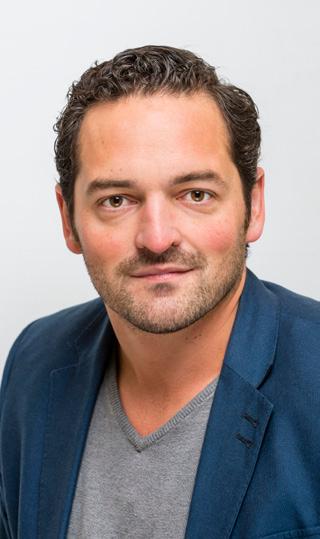
EDGE: SMART OFFICE BUILDINGS FOR A SUSTAINABLE FUTURE Interview with chief operating officer Boudewijn Ruitenburg
EDGE STADIUM AMSTERDAM
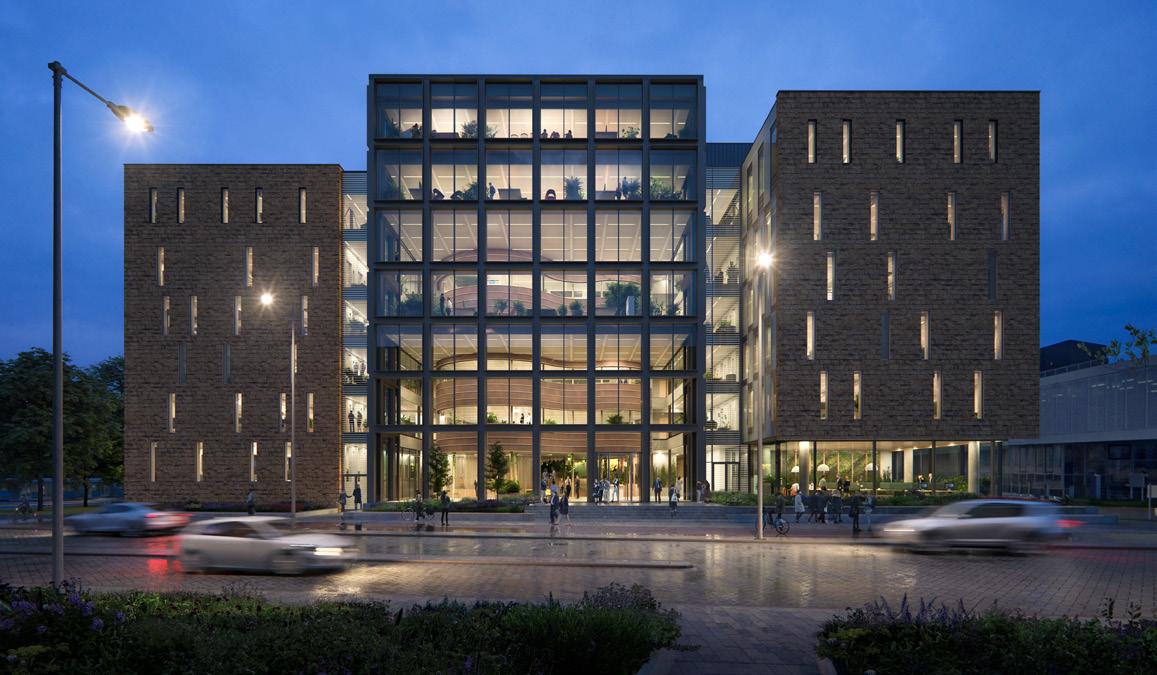
From London to Boston to Berlin, Dutch-based company EDGE is blazing a trail with buildings that are as iconic as they are sustainable – and where everything centres on the comfort of office occupants. Using smart software, they’re creating offices equipped for the future and renovating old, existing buildings into a sustainable, unified whole. Hello Zuidas met with Boudewijn Ruitenburg, the firm’s chief operating officer and in charge of securing new projects. As much as the bright lights of foreign cities beckon, EDGE certainly hasn’t lost sight of its home base. ‘Zuidas has some amazing challenges in store for us.’
EDGE Olympic Fred Roeskestraat 115 1076 EE Amsterdam +31 (0)88 170 10 00 amsterdam@edge.tech
EDGE AMSTERDAM WEST VALLEY

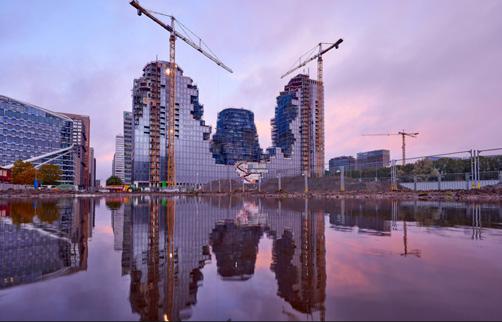
BOUDEWIJN RUITENBURG
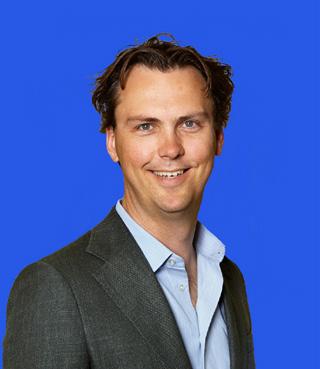
WHAT USERS WANT EDGE started out as a Dutch property developer focused mainly on offices and always putting the wants of future building users first. That user-centred approach made it popular. Across the border, too. The firm also realized early on that sustainability would come to play a key role in future developments. Ruitenburg: ‘When developing large offices there are so many things to consider. Both during and after construction, you want the whole process to be as sustainable as possible, so that even after completion you can adapt to an energy-neutral future.’ To help, a few years ago EDGE introduced something new: smart software that supports the development of sustainable properties. ‘With this software, a building’s owner and users get efficient service to use the office in the most targeted and optimal way.’
SUSTAINABLE AND EFFICIENT Alongside sustainable engineering and smart software, EDGE is working towards a sustainable future on yet another front. ‘With our EDGE Next platform we want to help upgrade existing building stock. Using our software, we can sit down with users to look at things that could be healthier, greener and more efficient. For us, step one is always to measure. To measure is to know what you can do better’, Ruitenburg explains. ‘When you spend a lot of time in a place, we think it stands to reason that you’d be concerned about its effect on health and the environment.’ Not surprisingly, Ruitenburg feels positive about the outlook for offices, though he expects companies will have some adapting to do. ‘Offices still serve a purpose, but in the future as more of a clubhouse. At the same time, COVID has made us realize that not all office spaces were as nice to be in from nine to five, five days a week. Companies will likely have to trade in some of the space they’re occupying now, but I expect that sustainability and health will take more and more of a front seat going forward.’
HOME MARKET Back in the Netherlands, EDGE is putting the finishing touches on two high-profile new buildings in Amsterdam that also speak to the firm’s versatility. EDGE Amsterdam West is a building dating from the 1970s which was completely renovated and upgraded to modern sustainability standards. And in Zuidas, Valley recently topped out – a building whose defining feature is that it’s covered in vegetation. ‘These buildings are completely different, but they do have two important things in common: they’re both sustainable and they’re both iconic.’ The world’s cites may be beckoning, but Ruitenburg stresses that EDGE’s home market is where some of the most interesting opportunities await. ‘From existing buildings to new, highperforming, sustainable office buildings. Gaining recognition for building quality is becoming increasingly important, and we want to promote that.’
PURPOSE, WHAT IS IT? And how to find it?
Lately, purpose is a topic on everybody’s lips. Companies are realizing now more than ever that making a profit is only one side of the coin. Strategic objectives have to align their societal impacts. At the same time, I’ve noticed many places are grappling with the question of what purpose really means, and how to embed it in their organizations. For me, purpose is really about accepting your responsibilities as a company. Not only for your own economic results, but also for the impact you have on wider society and the world, on people, and on the environment.
Making that pledge sounds straightforward enough, but in practice it can be tricky. That’s been confirmed by a study done by the Dutch Sustainable Growth Coalition, a group of Dutch multinationals investing in sustainable growth in tune with societal developments. Using the UN’s Sustainable Development Goals as a basis, they prioritize sustainability and purpose over profits. In the process, they’re trying to inspire other industry players to do the same, for example by sharing experiences and best practices in the areas they themselves are targeting. INCENTIVIZING AND ENTHUSING The study also offers some practical tools. Most important is to embed your purpose objectives in your organization and processes. That way, everybody’s actions will indeed be guided by those objectives. Getting all your employees to join that behavioural transformation takes work. But, with training, internal incentives and programmes geared towards the organizational culture, you can incentivize and enthuse people to change. What also helps, is making the steps very small, transparent and, above all, measurable, so everyone – from team to individual – can see their contribution. For this approach to succeed, however, leaders have to set the example. Cultural change only works if company leadership are involved in the objectives and actually perform them. They have to show what they’re changing and its concrete effects.
EMBRACING CHANGE Now, telling people how to tackle their purpose is relatively simple. The power of Accenture consists in coupling advice to implementation: we suit actions to words. Also when it comes to your purpose. We recently made that whole journey to a new – or really recalibrated – purpose again. ‘To deliver on the promise of technology and human ingenuity’ is now the foundation of our organization and our activities. We’re doing that by uniting the strengths of 500,000 people across the globe with
all the possibilities technology offers. Not merely to create value for ourselves, but for our wider community – our own people, our clients, our partners and society as a whole. This is how we can respond to the inevitable changes we’re experiencing on all fronts – from digitization and climate change to the impacts of the pandemic – and help to solve the big challenges.
JOINING THE PATH TO SUSTAINABLE GROWTH Purpose is inextricable from company strategy. So, in parallel with implementing our new purpose, we set out a business strategy wholly centred around achieving shared success. Having those concrete action plans, with concrete goals, bears out the strategy by which we want to make a positive difference with everyone in our community. To underscore just how serious this is for us, one of our actions towards creating a more sustainable future was the appointment of Peter Lacy as global chief responsibility officer in our global management team. His focus is on making sure we work responsibly and sustainably and tying that together across all our activities and services. We’d already set serious sustainability goals and now we’re taking those a step further. In 2025 we’ll be completely carbon neutral and waste-free. That makes us fully compliant with the UN’s Sustainable Development Goals. Moreover, we’ll tap our own experiences to assist clients to create their own sustainable growth.
TIME FOR TALK IS OVER Given that we’re striving for shared success, I think the digital conversation Peter Lacy recently had with DSGC chair Jan Peter Balkenende is especially on point. They considered how transformations to purpose-driven organizations are becoming the new normal. As much as many organizations are still grappling with how to frame and effectuate their purpose, what’s really key is that we join forces and share experiences. Because, let’s be honest, the time for talk is over. Whatever your organization and whatever you do, sustainability and a social conscience have to be at the core. The only way we can truly make progress is by getting to work right now, both within our own organizations and beyond.
ACCENTURE Scan the QR-code to listen the podcast
IRINE GAASBEEK

FINANCE AS A FORCE FOR How the EU Taxonomy will make Europe the first carbon-neutral continent
JOPPE VAN ONNA, JASPER MEIJER, YU-SHA VERGEER AND JULIA VAN BOVEN Sustainability will be top of mind for many Zuidas workers in 2021, with several sustainable finance regulations entering into force. These regulations aim to make Europe the world’s first carbon-neutral continent. In this article, ABN AMRO’s Sustainable Finance experts Joppe van Onna, Jasper Meijer, Yu-Sha Vergeer and Julia van Boven share some insights on the impact of this important topic.

STEERING CAPITAL TOWARDS GREEN INVESTMENTS The Green Deal is Europe’s new growth strategy. Frans Timmermans, vice president of the European Commission, describes it as a strategy where environmental, economic and social sustainability go hand in hand. To execute this strategy, the European Commission will invest one trillion euros in sustainable activities this decade. But that won’t be enough. The European Commission estimates that an additional 260 billion euros a year is needed from the private sector. To ensure the private sector makes the right investments, the European Commission has created an Action Plan on Sustainable Finance. This plan increases transparency and aims to stimulate long-term decision-making in financial and economic activities. To paraphrase
FINANCE AS A FORCE FOR THE SUSTAINABILITY SHIFT
Timmermans, ‘the costs of climate action may seem high, but are overshadowed by the costs of inaction’.
EUROPEAN DEFINITION OF ‘SUSTAINABLE’ The Taxonomy on Sustainable Finance is the cornerstone of this Action Plan. It introduces a common vocabulary on what is environmentally sustainable and functions as a dictionary for ‘green’ activities. For every sector, highly specified technical criteria are defined to determine whether activities can be called sustainable. This is important, because without the Taxonomy, understandings of ‘sustainable’ can diverge significantly across companies in different sectors. Without a common understanding, it is difficult for investors and consumers to compare and select genuine ‘sustainable’ investments. The Taxonomy ensures that everyone has the same understanding and stamps out so-called ‘greenwashing’: calling activities or products ‘green’ when in fact they are not.
How will this work? Let’s zoom in on an example from the transport sector. To achieve climate neutrality, a significant emissions reduction is needed in the transport sector. The Taxonomy informs investors which activities contributing to emissions reduction are ‘sustainable’. For example, manufacturing low-emission vehicles can be ‘environmentally sustainable’ when greenhouse gas emissions are below 50 grams CO2/km. Of course, it would be strange to call an activity sustainable if it reduces emissions whilst at the same time causing pollution or violating human rights. The Taxonomy therefore also requires a ‘do no significant harm’ assessment in order to qualify as sustainable.
ZUIDAS GETS TO WORK! In the years to come, many companies will need to learn the ‘language’ of the Taxonomy. The first actions are geared towards companies with more than 500 employees. From 2022 on, these corporates have to disclose information on whether activities are ‘sustainable’ according to the Taxonomy criteria. For financial institutions, this means they need to understand which of the activities they perform or finance can be called sustainable. And in order to achieve that, a great deal of work needs to be done!
Zuidas workers will be involved in many capacities. For example, lawyers who interpret and explain the new regulations, many of which are still being developed. Within ABN AMRO alone, over a hundred employees are involved in making the project a success. Across all of Europe, companies should be preparing for the question: ‘How green are your activities’? Or, from a consumer perspective: ‘Which companies are genuinely sustainable’? The Taxonomy will finally create a uniform definition of ‘environmentally sustainable’ in what was – until now – a fragmented landscape of definitions.
Want to lean more about the EU Taxonomy? Listen to our podcast (in Dutch) with ABN AMRO’s Sustainable Finance expert Julia van Boven and Brussels-watcher Evelien Alblas! Available via the QR Code.
CIRCL This information is provided in association with Circl. Circl was created by ABN AMRO as a place to share knowledge about circularity and provide clients with sound, reliable advice. As a circular platform in Zuidas, Circl is also where the forces powering society, business and finance work together to take action for a sustainable world.
ADJUST TO CHANGE
Studio Gyzell bags are beautiful and timeless investment pieces you can easily customize for every occasion, transforming sophisticated grey in the morning into stunning gold at night. Innovating Studio Gyzell brings a limited collection of modular Leather bags to adjust to change - both bag and mindset. Handcrafted in Europe to stimulate conscious consumption representing the Dutch brand’s philosophy on sustainable luxury.
ADJUSTABLE LEATHER BAGS. MADE TO LAST. MADE FOR CHANGE. Let Studio Gyzell inspire you and create 30 unique looks with 3 timeless and adjustable bags, featuring 10 interchangeable elements. Handmade of the finest Italian zero impact leather to cherish forever, to age and change beautifully, together with you. In opting for a Studio Gyzell bag, you join the brand’s charity initiative of donating to LINDA.foundation.

WIN!
GIVEAWAY
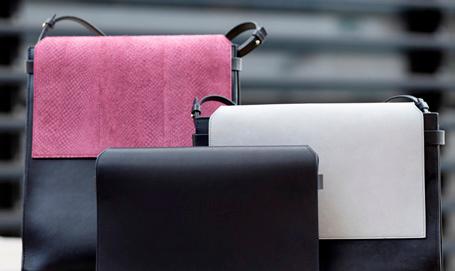
Calling all ladies in Zuidas! Want to win a STUDIO GYZELL handbag? Or are you feeling generous and do you think a colleague, friend or your mum deserves a new bag? Enter our competition now!
For a chance to win Studio Gyzell’s Lyra Shoulder Bag, all you have to do is: • Follow #studiogyzell on Instagram • Send an email explaining why you or someone you know deserves a stylish sustainable luxury handbag. • Let us know which colourful interchangeable front is your favourite and it will be included with your bag. 22 February 2021 and you could be the lucky winner!
ABOUT THE FOUNDER: ANIKÓ KOSSEN-VARGA With her medical background, fifteen years of experience in environmental and occupational health and her love for timeless design, founder Anikó Kossen-Varga brings a unique perspective as well as passion to the fashion industry. She has added a personal touch to the brand by naming it after her grandmother and turned Studio Gyzell into a melting pot of sustainability and style, with her storytelling bags symbolizing a Submit your answer to: info@zuidaspublishers.nl before
conscious mindset.
Available online: www.studiogyzell.com info@studiogyzell.com
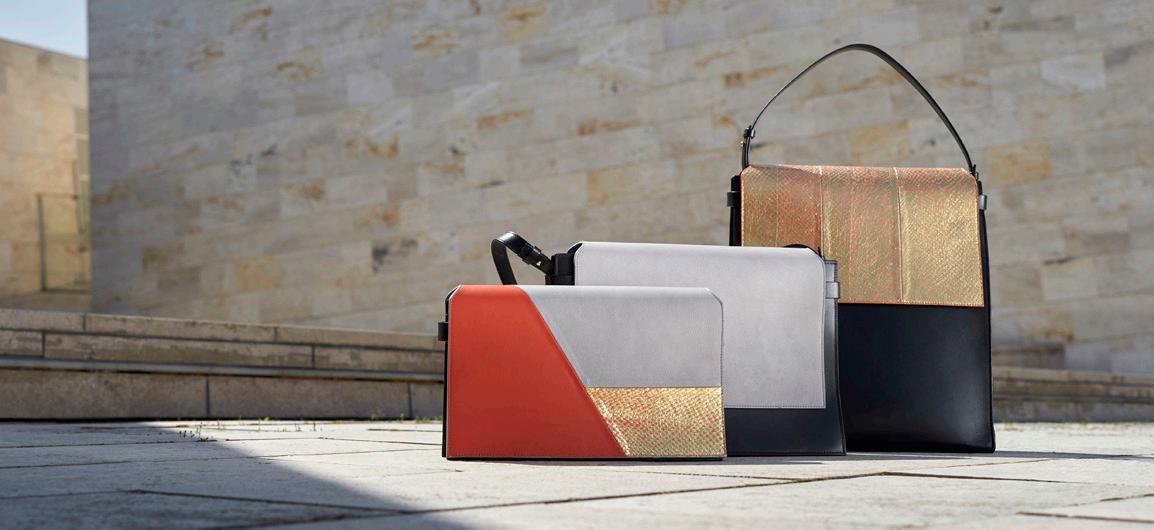
LIVING ROOF does double duty for teaching and research SDG SCANS
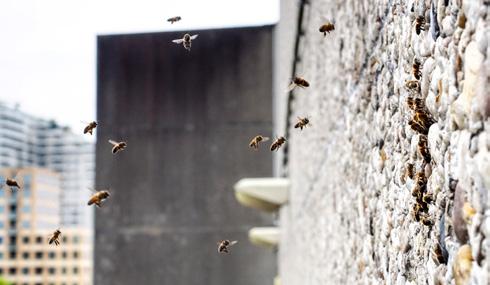

A blue green research roof has been installed on top of VU’s Main Building. Seeded with local grasses and herbs, the system also has ponds for birds, as well as a wild bee colony. Researchers at the Amsterdam Sustainability Institute (ASI) will be using the living roof for their teaching and research. For example to study changes in air temperature, humidity, water balance and insulating effect. And their teaching and research work will in turn contribute to knowledge about green rooftops in Zuidas, which can be used to model the impact of roofing all Zuidas with blue green systems.
GREENING THE CAMPUS Green roofs also play a key part in greening the campus. The university aims to create a healthy and sustainable space that’s open to everyone, where people can gather and relax. Plans for the renovated campus square will add 20-30% more green space to the campus, with the planting of mature trees and a variety of bee and bird-friendly shrubs and flora native to the area. All this will make the VU Campus into something like a Living Lab – an attractive place for both nature and the people who work and study here. SCAN THE QR-CODE and check out the green roof here! The VU’s Amsterdam Sustainability Institute and the Sustainability Leadership Hub have co-developed and carefully designed the SDG Scan to help businesses prioritize and tackle challenges in a sustainable fashion. We have equipped our junior consultants with the knowledge and tools to help you future proof your business. Let’s get started!
HOW WE WORK 1. Our junior consultants conduct a group interview with the organization to discuss main challenges and company values. 2. Based on the interview and your company’s strategic documents / website / other relevant information we will identify ‘hotspots for change’. 3. These ‘hotspots for change’ are placed in the framework of the UN Sustainable Development Goals and targets will allow us to identify a set of priority SDGs & targets. 4. We will provide an advisory report, that includes a set of recommendations on how to work towards this set of SDGs, while creating value for your company and helping it tackle
challenges in a sustainable fashion. VU AMSTERDAM Want to find out more, and to see how other organizations are tackling the SDGs? Go to: vu-ondernemend.nl/sdg-scan-amstelveen
INVITE NATURE INSIDE and create a sound absorptive wall or decorative panel with 100% natural mummy-moss!
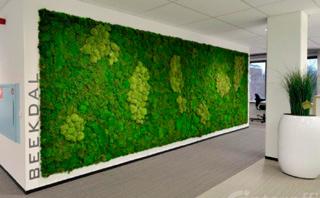
Soundless Green wall, the new decorative and natural solution to improve room acoustics. With 100 % natural moss covering which creates a seamless and high-quality sound absorptive wall that will give your room an exclusive design. This Green Wall will keep it’s striking appearance, is virtually maintenance free and needs no water or daylight!
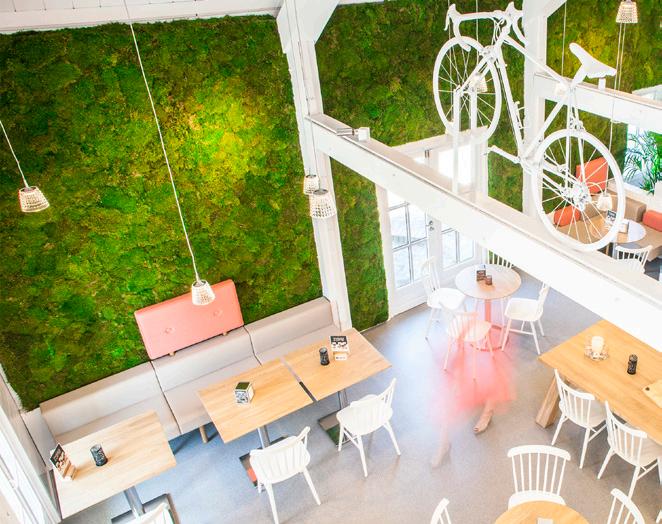
HEALTH AND WELLBEING Pleasant room acoustics not only improve the sound experience in a room, they are crucial for health and wellbeing! The call for natural green products is getting louder every day. Research has shown that natural greenery in an office boosts productivity of employees, improve people’s mood and reduces sick days! It even influences our taste, which makes it an excellent addition to the interior design of restaurants.
This solution is custom made so it can be produced in any sized panels to create a seamless wall. It can also be delivered in decorative (sound absorptive) room dividers, flower pots or as “paintings” in any desired size, with or without luxury frame. All panels are handmade which makes each and every piece fully unique!
USEFUL EVERYWHERE The Green Wall is suitable for almost all indoor applications, including hotels, lounge room, foyers, reception areas, conference rooms, art galleries, conference rooms, showrooms, shops, airports, restaurants, offices etc. The moss wall will impress with its outstanding acoustic capabilities and a is stunning visual point.
